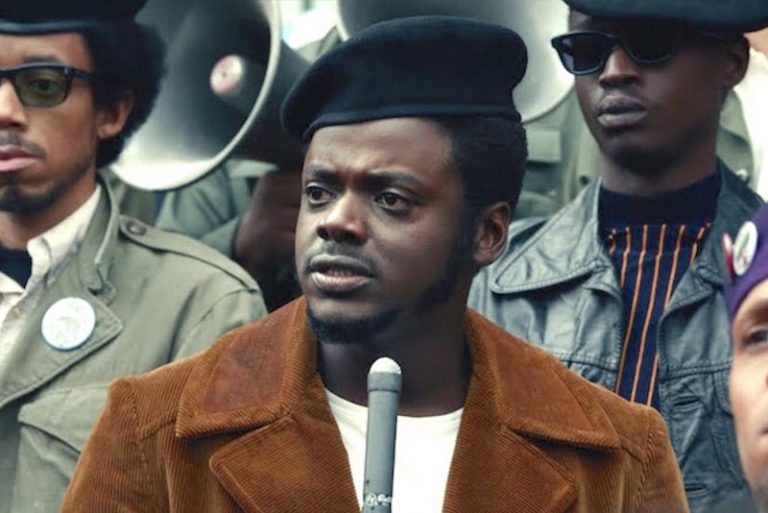
The news and social media offer all-too-frequent examples of the mistreatment of communities of color in America. The concept of systemic racism is finally being addressed, as people in power name it and refuse to let it continue to fester unchecked. Cell phones and the Internet have merely made what has been happening since the founding of this country, is some form or another, more visible. Just as the lynching of Black people used to go unpunished by law enforcement, outright persecution, targeting, and even killing of anyone deemed a threat simply because of the color of their skin has also been disturbingly common in our history.
Judas and the Black Messiah looks at the story of Fred Hampton (Daniel Kaluuya), the chairman of the Illinois Black Panther Party, who was assassinated by police in his own home at the age of twenty-one in 1969. William O’Neal (LaKeith Stanfield) is the film’s protagonist, arrested several years earlier for impersonating an FBI agent and then forced to infiltrate Hampton’s organization by a real FBI agent, Roy Mitchell (Jesse Plemons). O’Neal gets close to Hampton, becoming his driver and one of his most dependable lieutenants, and his vision is gradually clouded by a growing appreciation for Hampton’s worldview and the moral questionability of his own complicity in his downfall.
The second half of this film’s title, “the black messiah,” refers to a worst-case scenario spoken about by FBI Director Edgar J. Hoover (Martin Sheen) in the opening scene. Allowing a figure to become prominent and respected enough by the Black community, particularly its more militant arms, like the Black Panthers, would be dangerous and unacceptable, he warns in an ominous presentation. Mitchell, sitting in the audience, digests this information and then uses it to convince O’Neal repeatedly that what Hampton and his followers do is just as bad as the actions of the KKK.
Hampton, for his part, does advocate violence, but his perspective is more nuanced and reactive specifically to the brutal and inhuman way that he and other have been treated. Sitting back and doing nothing would be tantamount to surrender, and he teaches to adoring audiences the values he has learned and his life and how that has educated him on what Black people must do in order to ensure their own survival. His speaking style, which often involves him starting softly and defiantly and building in passion, is indeed electric.
There is some crossover between this film and its cinematic sibling, “The Trial of the Chicago 7,” in which Hampton also appears, played by Kelvin Harrison Jr. Bobby Seale, the lone Black defendant who constitutes the eighth of the seven men on trial, is treated like an animal by the horrible judge, who presumes that his every word is an affront against the dominance and tranquility of white America. In Judas and the Black Messiah, Hoover references a particularly harrowing moment from the trial involving Seale being bound and gagged, joking about it and celebrating that one nuisance has been appropriately handled.
In this film, Hampton gets to have a continuous platform, working with those open to hearing his perspective and negotiating conflicts that exist within the Black community and the various groups that operate in different territories. Mitchell here is the afterthought, meeting his informant at a fancy restaurant that looks nothing like anywhere else O’Neal spends his time, purposely a “step up” from his normal activist life and an indicator of what rewards may come from turning on those deemed unrefined or revolutionary.
It’s fitting to see Kaluuya and Stanfield in these roles given the parts that first garnered them attention. Get Out and Sorry to Bother You were both darkly comedic critiques of the way in which Black people are subjugated, exaggerated fantasy scenarios designed to draw out truths. Participating in this project, a fully serious effort that does include a few welcome moments of levity, represents a more dramatic approach to the same idea: the notion of Black existence shouldn’t be controversial, and the emergence of supposedly controversial opinions typically comes from necessity rather than any sort of inherently violent or hateful impulse.
Kaluuya, who has deservedly been nominated for awards for his performance, marvelously captures the infectious energy with which Hampton inspires, confident enough in his own perspective that he doesn’t need to actively work to impress others. Stanfield draws out the tremendous conflict O’Neal feels within himself, wearing two identities at the same time that do in fact influence each other. The only place they fall short is that both actors are about a decade older than their characters, and it is hard to believe that they could be so young. In the supporting cast, Dominique Fishback, a breakout from the underappreciated Night Comes On, shines as Deborah Johnson, Hampton’s girlfriend who appreciates his message but sees the danger he faces on a regular basis for preaching his views, and Plemons, no stranger to playing bad guys masquerading as nice guys after Breaking Bad, successfully brings his FBI agent to life without turning him into a caricature.
Director Shaka King presents the legacy of Hampton and O’Neal on screen in a compelling and engaging manner, structuring this film as a political thriller that builds to its predictably tragic end. This film feels as relevant as ever, an important chronicle of a horrific stain on American history that should inspire a spotlight on modern-day injustices that will not take half a century to be exposed.
Grade: B+
Judas and the Black Messiah premiered at the 2021 Sundance Film Festival and will be released simultaneously in theaters and on HBO Max on Friday, February 12th.

